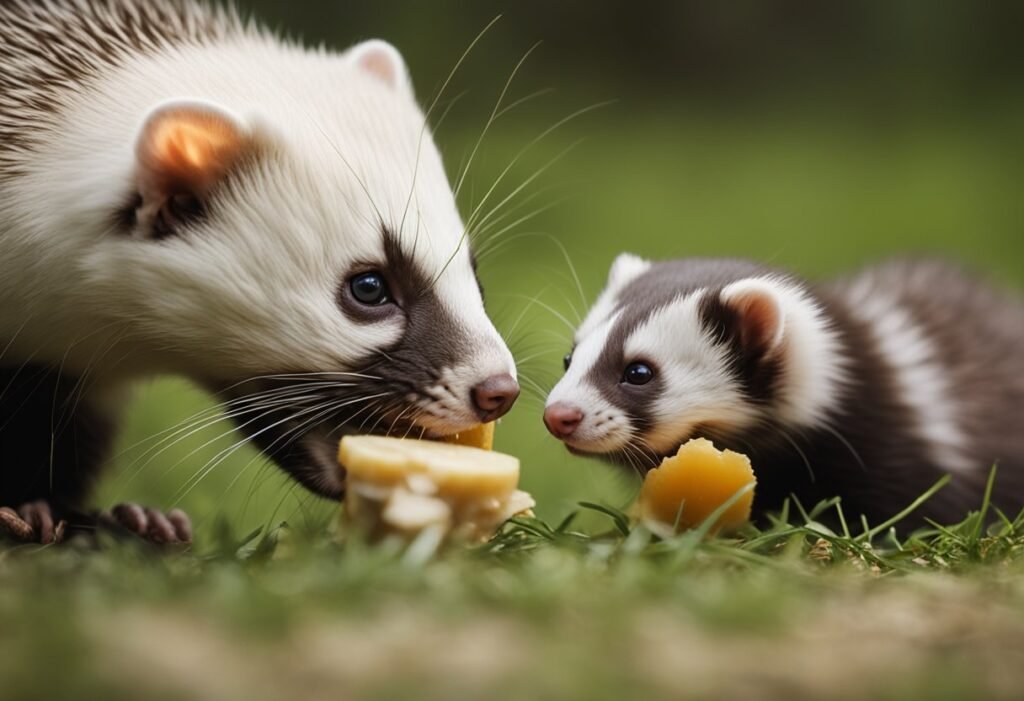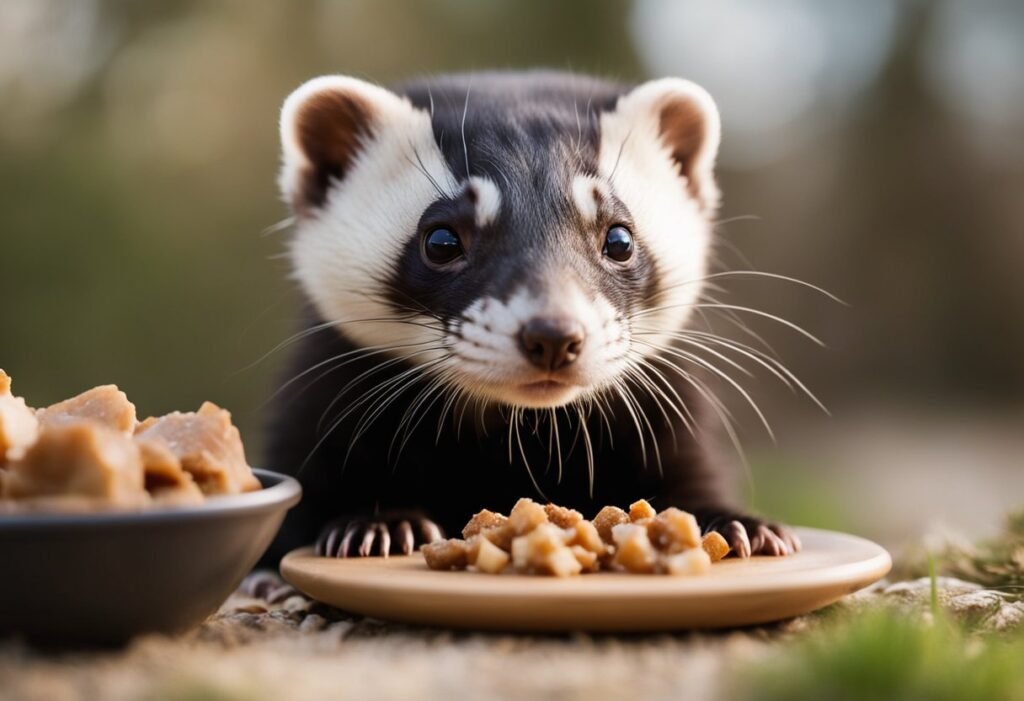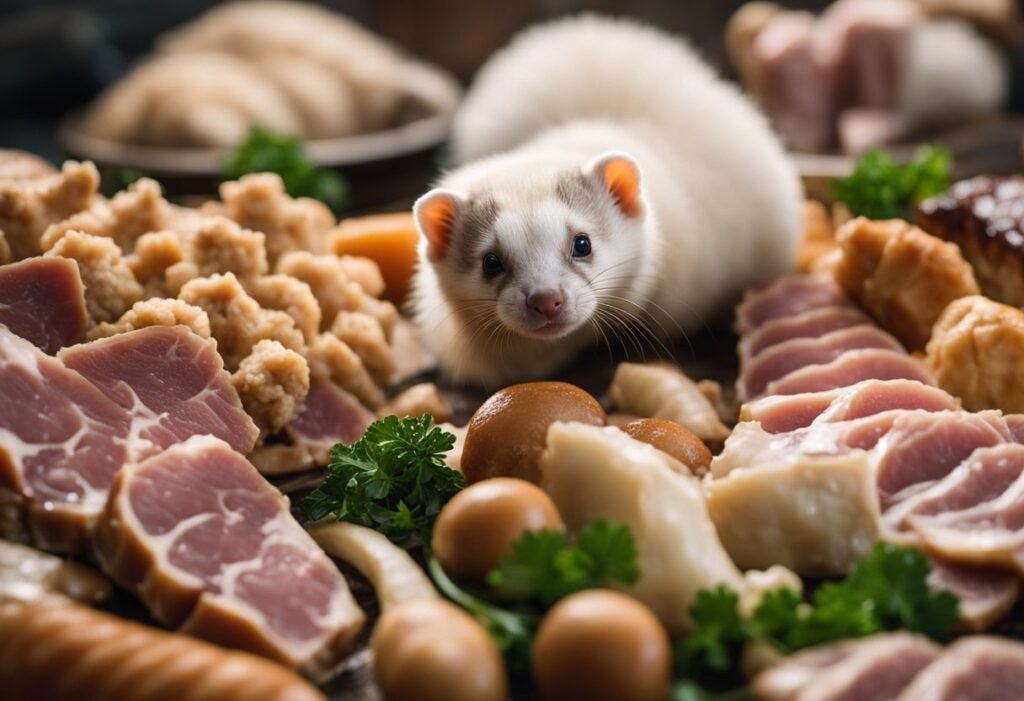Ferrets are carnivorous animals that require a diet high in protein. As such, it’s important to provide them with a balanced diet that includes meat. However, not all meats are safe for ferrets to consume, and it’s important to know what types of meat are appropriate for their diet.

When it comes to feeding ferrets meat, it’s important to stick to lean, high-quality sources. Chicken, turkey, and beef are all good options, as long as they are cooked and served plain without any added seasonings or sauces. Organ meats, such as liver and kidneys, can also be included in small amounts as a source of essential vitamins and minerals.
It’s important to note that not all meats are safe for ferrets to eat. Pork, for example, should be avoided due to its high fat content, which can cause digestive issues. Additionally, processed meats like hot dogs and deli meats should be avoided due to their high salt and preservative content. By sticking to lean, high-quality meats, ferret owners can ensure their pets are getting the nutrition they need to thrive.
What Meat Can Ferrets Eat

Ferrets are obligate carnivores, which means that they require a diet that is high in protein and fat. Meat is the primary source of nutrition for ferrets, and it is essential to choose the right type of meat to ensure that they get the nutrients they need.
Here are some types of meat that are safe for ferrets to eat:
- Chicken: Chicken is an excellent source of protein and is low in fat. It is also easy to digest, which makes it a great choice for ferrets.
- Turkey: Turkey is another good source of protein and is also low in fat. However, it is important to remove the skin and bones before feeding it to your ferret.
- Beef: Beef is a good source of protein, but it is also high in fat. It is best to choose lean cuts of beef and to feed it to your ferret in moderation.
- Lamb: Lamb is another good source of protein, but it is also high in fat. It is best to choose lean cuts of lamb and to feed it to your ferret in moderation.
- Fish: Fish is a good source of protein and is also rich in omega-3 fatty acids, which are essential for your ferret’s health. However, it is important to choose fish that is low in mercury, such as salmon or trout.
It is important to note that ferrets should not be fed raw meat, as it can contain harmful bacteria that can make them sick. Cooked meat is the safest option for ferrets.
In addition to meat, ferrets can also eat eggs, which are a good source of protein. However, it is important to cook the eggs before feeding them to your ferret.
Overall, a diet that is high in protein and fat is essential for the health of your ferret. By choosing the right types of meat and feeding them in moderation, you can ensure that your ferret gets the nutrients they need to thrive.
Ferret Dietary Basics

Nutritional Needs
Ferrets are obligate carnivores, meaning they require a diet consisting primarily of meat. This is because their digestive system is designed to break down and absorb nutrients from animal-based protein sources. In the wild, ferrets hunt and eat small animals such as rodents, birds, and insects.
When it comes to feeding domesticated ferrets, it’s important to ensure they receive a balanced diet that meets their nutritional needs. Ferret food should contain a minimum of 32% protein and 18% fat, with a low percentage of carbohydrates.
Raw Diet Benefits
Some ferret owners choose to feed their pets a raw diet, which involves feeding them uncooked meat, bones, and organs. Proponents of the raw diet argue that it is more natural for ferrets and provides a range of health benefits.
Raw meat contains natural enzymes and nutrients that may be destroyed during the cooking process. Additionally, feeding raw bones can help keep a ferret’s teeth clean and healthy.
However, it’s important to note that feeding a raw diet requires careful preparation to ensure the meat is safe and free from harmful bacteria. It’s recommended to consult with a veterinarian or animal nutritionist before switching to a raw diet for your ferret.
Safe Meats for Ferrets

Ferrets are obligate carnivores, which means they require a diet consisting mainly of meat. Meat provides the necessary protein and fat that ferrets need to maintain their health. However, not all meats are safe for ferrets to eat. Here are some safe meats for ferrets:
Chicken and Turkey
Chicken and turkey are excellent sources of protein for ferrets. They are low in fat and easy to digest, which makes them a great choice for ferrets who have sensitive stomachs. It is important to note that the meat should be cooked and boneless to prevent any choking hazards or digestive issues.
Rabbit
Rabbit is another safe meat for ferrets. It is a lean protein source that is easy to digest. Some ferret owners prefer feeding their pets with rabbit meat because it is a novel protein source that their pets may not have encountered before. It is important to note that the meat should be cooked and boneless to prevent any choking hazards or digestive issues.
Lamb
Lamb is a good source of protein and fat for ferrets. It is a red meat, which means it contains more iron than other meats. However, it is important to note that lamb is higher in fat than other meats, so it should be fed in moderation.
Beef
Beef is a safe meat for ferrets, but it should be fed in moderation. It is a red meat, which means it contains more iron than other meats. However, it is also higher in fat than other meats, so it should be fed sparingly. It is important to note that the meat should be cooked and boneless to prevent any choking hazards or digestive issues.
In conclusion, ferrets require a diet consisting mainly of meat, but not all meats are safe for them to eat. Chicken, turkey, rabbit, lamb, and beef are safe meats for ferrets, but they should be fed in moderation and cooked and boneless to prevent any choking hazards or digestive issues.
Preparation and Serving
Meat Handling Safety
When preparing meat for a ferret, it is important to prioritize safety. Raw meat can contain harmful bacteria that can make both the ferret and the owner sick. Therefore, it is recommended to handle meat with gloves and to thoroughly clean all surfaces and utensils that come into contact with raw meat. Additionally, it is important to store meat at the proper temperature to prevent bacterial growth.
Serving Sizes and Frequency
Ferrets are obligate carnivores, meaning they require a diet high in animal protein to thrive. When serving meat, it is recommended to offer small pieces that are easy for the ferret to chew and digest. The serving size should be based on the ferret’s size and activity level. As a general rule, ferrets should be fed 2-3 small meals per day.
It is important to note that meat should not be the only component of a ferret’s diet. A balanced diet for a ferret should also include high-quality commercial ferret food and occasional treats. Consult with a veterinarian to determine the appropriate diet for your ferret.
Commercial Ferret Foods
When it comes to feeding ferrets, commercial ferret foods are a convenient and easy option. These foods are specifically formulated to meet the nutritional needs of ferrets. However, not all commercial ferret foods are created equal. It’s important to choose a high-quality food that contains the right balance of nutrients.
Kibble
Kibble is a popular choice for many ferret owners. It comes in a variety of flavors and textures, and is easy to store and serve. Look for a kibble that is high in protein and fat, and low in carbohydrates. Ferrets have a high metabolism and require a diet that is rich in animal protein.
Wet Foods
Wet foods are another option for feeding ferrets. They come in cans or pouches and are often more palatable than kibble. Wet foods can be a good choice for ferrets who have trouble chewing or digesting dry food. Look for a wet food that is high in protein and low in carbohydrates.
Freeze-Dried Options
Freeze-dried foods are a convenient option for ferret owners who want to provide their pets with a high-quality diet. These foods are made by freeze-drying raw meat, which preserves the nutrients and flavor. Freeze-dried foods can be fed as a standalone meal or as a supplement to kibble or wet food. Look for a freeze-dried food that is made from high-quality, human-grade meat.
Overall, commercial ferret foods can be a convenient and nutritious option for feeding your pet. However, it’s important to choose a high-quality food that meets your ferret’s nutritional needs. Be sure to read the ingredients list and choose a food that is high in animal protein and low in carbohydrates.
Foods to Avoid
When it comes to feeding ferrets, it is important to be aware of the foods that can be harmful to them. Here are some foods that should be avoided:
Processed Meats
Ferrets are carnivores and require a diet that is high in protein. While some types of meat are suitable for ferrets, processed meats such as sausages, hot dogs, and deli meats should be avoided. These types of meats often contain additives, preservatives, and high levels of salt which can be harmful to ferrets.
High-Carbohydrate Foods
Ferrets have a short digestive tract, which means that they cannot digest carbohydrates well. Foods that are high in carbohydrates, such as fruits, vegetables, and grains, should be avoided. These types of foods can cause digestive problems and lead to health issues in ferrets.
Toxic Foods
There are several foods that are toxic to ferrets and should be avoided at all costs. These include chocolate, caffeine, alcohol, onions, garlic, and grapes. These foods can cause serious health problems and even death in ferrets.
It is important to provide ferrets with a balanced and nutritious diet that meets their specific dietary needs. By avoiding these harmful foods, ferret owners can help ensure their pets remain healthy and happy.
Supplements and Treats
Oils and Fats
Ferrets require a high-fat diet, and certain oils and fats can be beneficial as supplements. Fish oil, for example, can provide omega-3 fatty acids that support a healthy coat and skin. However, it is important to avoid oils and fats that are high in omega-6 fatty acids, as they can cause inflammation and other health issues. Ferrets can also benefit from small amounts of animal fats, such as chicken or beef fat, as a source of energy.
Healthy Treats
While ferrets should primarily consume a diet of meat, they can enjoy occasional healthy treats. Cooked eggs, for example, can provide a good source of protein and are a popular treat among ferrets. Small amounts of fruits and vegetables can also be offered as treats, but they should not make up a significant portion of the ferret’s diet. It is important to avoid sugary treats and processed foods, as these can lead to obesity and other health issues in ferrets.
Overall, supplements and treats can be a valuable addition to a ferret’s diet when offered in moderation and with consideration of their nutritional needs. It is important to consult with a veterinarian to ensure that any supplements or treats are appropriate for your individual ferret.
Frequently Asked Questions
What types of raw meat are safe for ferrets to consume?
Ferrets are obligate carnivores, which means that they require a diet that is high in protein and low in carbohydrates. Raw meat is an excellent choice for ferrets, as it provides them with the nutrients they need to thrive. Some safe options for raw meat include chicken, turkey, beef, and lamb. It is important to make sure that the meat is fresh and has been handled properly to avoid any contamination.
Is it acceptable for ferrets to eat cat or dog food?
While cat and dog food may seem like a convenient option for feeding ferrets, it is not recommended. These foods are not formulated specifically for ferrets and may not provide them with the necessary nutrients they need. Additionally, many cat and dog foods contain fillers and additives that can be harmful to ferrets.
Can ferrets have eggs as part of their diet?
Eggs are a great source of protein for ferrets and can be included as part of their diet. However, it is important to make sure that the eggs are fully cooked to avoid any risk of salmonella. Raw eggs should be avoided.
What are some suitable treat options for ferrets?
Ferrets enjoy a variety of treats, including freeze-dried meat, cooked chicken, and small amounts of fruits and vegetables. It is important to keep in mind that treats should only be given in moderation and should not make up a significant portion of the ferret’s diet.
What should I feed my ferret in case of emergency food shortages?
In case of emergency food shortages, it is important to have a backup plan for feeding your ferret. Some options include canned cat food, cooked chicken, and raw meat. It is important to avoid feeding your ferret foods that are high in carbohydrates or contain fillers and additives.
Which specific meat do ferrets prefer the most?
Ferrets have individual preferences when it comes to food, so there is no one specific meat that all ferrets prefer. However, many ferrets enjoy chicken and turkey as part of their diet. It is important to offer a variety of meats to ensure that your ferret is getting a well-rounded diet.





